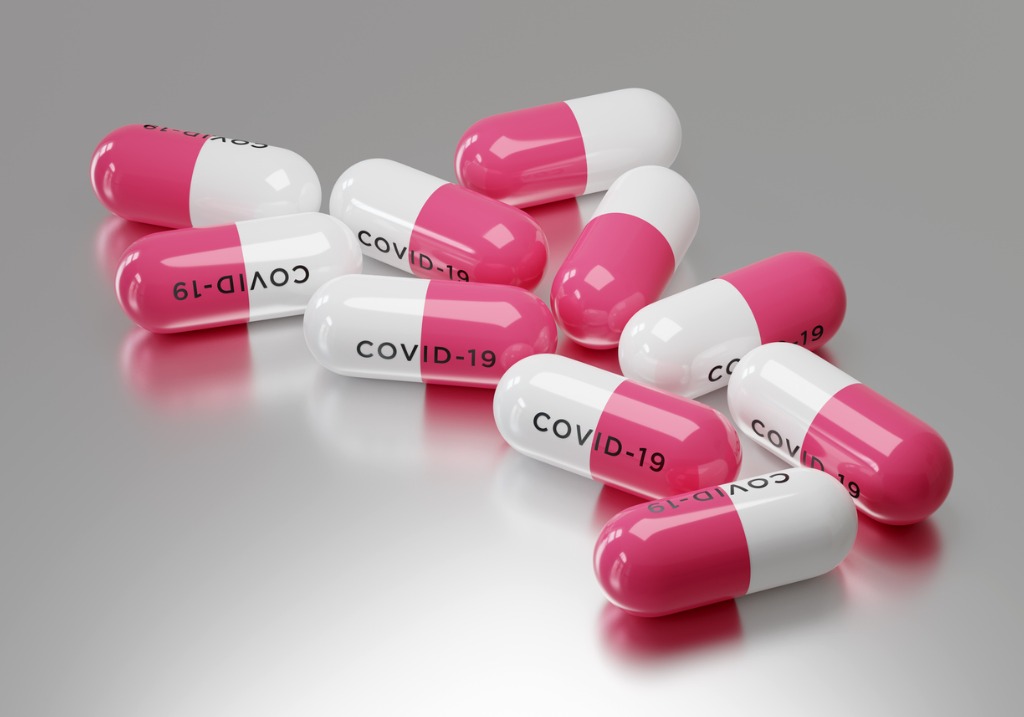
While COVID-19 vaccines confer a certain degree of immunity to the virus, they are not 100% effective in all cases 1. As such, there remains a need to develop treatments for individuals who contract COVID-19. To this end, COVID-19 anti-viral treatments have been gaining clinical momentum, recently shown by clinical trials in various phases to be highly effective in rapidly treating symptoms of COVID-19.
In 2021, British regulators were the first to approve of an orally administered anti-viral COVID-19 medication, molnupiravir, manufactured by Merck & Co. and Ridgeback Biotherapeutics 2. Initially designed by researchers at Emory University to treat infections of the Venezuelan equine encephalitis virus, it resembles building blocks of the SARS-CoV-2 genome, fooling the virus into producing copies of its genetic code that are plagued with mutations – ultimately leading to its self-inflicted death and significantly reducing viral load. A phase II/III randomized trial found that, among individuals with mild or moderate COVID-19 who had at least one risk factor for severe COVID-19, molnupiravir resulted in a 50% reduction in the risk of hospitalization or death when administered within five days of symptom onset 3. Although data have yet to be published in peer-reviewed journals, in light of these promising results, an emergency use authorization application was submitted to the US Food and Drug Administration (FDA).
More recently, a similar antiviral treatment, Paxlovid, has been studied by Pfizer 4. Administered alongside an older antiviral, ritonavir, twice daily, the treatment inhibits the main protease key to SARS-CoV-2 replication 5. Preliminary data were assessed in over 1,200 COVID-19-positive individuals at high risk of developing severe illness 6and found that the treatment led to an 89% reduction in the risk of hospitalization or death. However, the research has also yet to be peer-reviewed.
Finally, a third anti-viral, AT-527, has been produced by Roche and Atea Pharmaceuticals. Despite working according to a mechanism similar to that of molnupiravir, the drug failed to show a significant drop in SARS-CoV-2 viral load in patients with mild or moderate COVID-19 in clinical trials.
Interestingly, a different line of anti-viral research has pointed to a novel strategy. SARS-CoV-2 infection was found to induce the activation of the unfolded protein response (UPR), and inhibition of the UPR was found to reduce viral replication in vitro. This UPR pathway is also associated with COVID-19-associated pulmonary complications. Its potential as a focal point for both anti-viral and therapeutic effects has thus prompted rigorous research on its use as a completely novel and particularly powerful clinical tool against COVID-19 7,8.
The development of these anti-viral treatments holds particular promise beyond the only other antiviral drug approved to treat COVID-19 as of early November, remdesivir, which needs to be delivered intravenously. First, if used to prevent the virus from gaining a foothold in the first place, anti-viral medications may be a powerful tool to thwart full-blown COVID-19 prior to becoming more virulent, thereby curtailing the duration of the disease and transmissibility. Second, their oral administration route makes them easy and non-invasive to administer. Third, they could be particularly powerful in regions in which vaccination rates remain low, such as lower-income countries.
In the end, fighting the COVID-19 pandemic will warrant a multipronged effort, including but not limited to vaccination, monoclonal antibody treatments, anti-viral medications, and ongoing public and patient education.
References
- Olliaro, P., Torreele, E. & Vaillant, M. COVID-19 vaccine efficacy and effectiveness—the elephant (not) in the room. The Lancet Microbe (2021). doi:10.1016/S2666-5247(21)00069-0
- Willyard, C. How antiviral pill molnupiravir shot ahead in the COVID drug hunt. Nature (2021). doi:10.1038/d41586-021-02783-1
- Merck and Ridgeback’s Investigational Oral Antiviral Molnupiravir Reduced the Risk of Hospitalization or Death by Approximately 50 Percent Compared to Placebo for Patients with Mild or Moderate COVID-19 in Positive Interim Analysis of Phase 3 Study – Merck.com. Available at: https://www.merck.com/news/merck-and-ridgebacks-investigational-oral-antiviral-molnupiravir-reduced-the-risk-of-hospitalization-or-death-by-approximately-50-percent-compared-to-placebo-for-patients-with-mild-or-moderat/.
- Pfizer’s Novel COVID-19 Oral Antiviral Treatment Candidate Reduced Risk of Hospitalization or Death by 89% in Interim Analysis of Phase 2/3 EPIC-HR Study | Business Wire. Available at: https://www.businesswire.com/news/home/20211105005260/en/.
- Jin, Z. et al. Structure of Mpro from SARS-CoV-2 and discovery of its inhibitors. Nature (2020). doi:10.1038/s41586-020-2223-y
- A Study of PF-07321332/Ritonavir in Nonhospitalized High Risk Adult Participants With COVID-19 – Full Text View – ClinicalTrials.gov. Available at: https://clinicaltrials.gov/ct2/show/NCT04960202.
- Barabutis, N. Unfolded protein response in the COVID-19 context. Aging Heal. Res. (2021). doi:10.1016/j.ahr.2020.100001
- Echavarría-Consuegra, L. et al. Manipulation of the unfolded protein response: A pharmacological strategy against coronavirus infection. PLoS Pathog. (2021). doi:10.1371/journal.ppat.1009644

